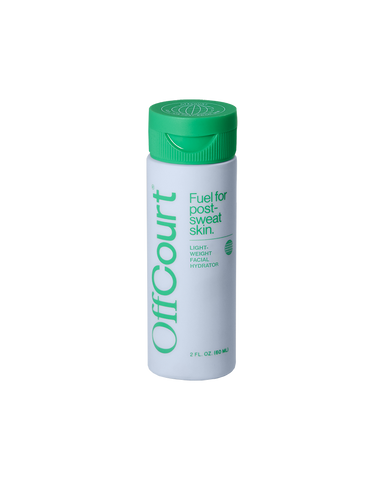How to Tell if Your Skin Is Dehydrated and How to Improve It?
You might have guessed it—dehydrated skin is simply skin that's lacking water. While it can feel uncomfortable and appear dull, the right habits and products can make a huge difference.
This guide will help you recognize what dehydrated skin looks like, what causes dehydration, and how to boost hydration. Plus, we’ll clarify the difference between dry skin vs. dehydrated skin, so you can choose the best way to address your specific needs.
Signs of Poor Skin Hydration
Dehydrated skin happens when your body loses more water than it takes in. It’s a symptom of dehydration throughout the body, so any skin type can experience it at some point.
So how do you tell if your skin is dehydrated? Look out for these common signs:
- Fine Lines: When your skin is thirsty, it has trouble retaining moisture and elasticity, making fine lines more apparent. Dehydration lines under the eyes are a common sign of this issue.
- Dryness:: Dehydrated skin texture tends to look rough and flaky, and sometimes it can even crack. Dry, dehydrated hands or elbows may appear often.
- Redness: You might notice your skin looking red and inflamed when it's lacking moisture.
- Itching: Yes, that constant itching that makes it hard to focus throughout the day can be a sign of dehydrated skin.
- Dull Skin: Dehydrated skin often loses its natural glow, making you look a bit tired and worn out. Complexion may look uneven too.
- Sunken Eyes: The skin around your eyes can pull away from your eye sockets, causing a sunken once again tired look.
- Bags under eyes: Lack of moisture can affect skin turgor and also cause those pesky under-eye bags.
What Causes Skin Dehydration?
Several factors can cause dehydrated skin. Let’s talk about the main ones:
- Environmental Factors: Harsh weather, pollution, and UV rays can take moisture out of your skin.
- External Factors: Habits like smoking, excessive drinking, and steamy showers can strip away your skin's natural oils. Air conditioning and central heating are not helpful to dehydrated skin either.
- Fatigue or Stress: Stress and lack of sleep can do a number on your hormones and affect your skin’s ability to repair itself.
- Excessive Cosmetics: Overdoing with harsh products can also dry you out. It’s best to stick with gentle products and avoid over-exfoliating.
- Aging: As you get older, your skin’s ability to retain moisture weakens, leading to dryness and a loss of skin turgor.
How Do You Treat Dehydrated Skin?
The key to tackling dehydrated skin is to start with the basics—hydration. Drinking plenty of water helps your skin to stretch and protect you as it should. Beyond that, there are several lifestyle changes and skin care tips that can also help:
- Drink Plenty of Water: Staying hydrated from the inside out is very important for your skin. Many say that you should drink at least eight glasses of water a day, but this depends on your body weight and activity levels. It’s better if your doctor tells you what amount is appropriate for you.
- Choose your products wisely: Ingredients like ceramides, shea butter, hyaluronic acid, and glycerin prevent moisture from escaping and may be great for your skincare routine.
- Reduce Alcohol Consumption: Alcohol blocks the secretion of antidiuretic hormone, so cutting back on it helps you avoid dehydrated skin.
- Limit Caffeine: Caffeine can also act as a diuretic, leading to water loss. Enjoy caffeinated beverages in moderation.
- Quit Smoking: Smoking restricts blood flow, which affects your skin’s ability to stay hydrated.
- Exercise Regularly: Regular exercise improves circulation, delivering more nutrients to your skin. Remember to stay hydrated and to use appropriate products for your exercise regimen.
- Get Adequate Sleep: Good sleep gives your skin time to repair and regenerate.
- Eat a Plant-Based Diet: Fruits, veggies, and legumes are packed with the nutrients and vitamins your skin needs to stay healthy.
Dehydrated Skin vs. Dry Skin
They might sound similar, but they’re quite different! Dry skin is a genetic skin type that lacks natural oils, while dehydrated skin happens when there’s a lack of water and is often determined by external factors.
When you have dry skin, your glands don’t produce enough natural oils. It often requires regular moisturizing to keep it in check. Sometimes, it can be linked to health conditions like hypothyroidism or skin diseases such as eczema or psoriasis.
On the other hand, dehydrated skin can change depending on your lifestyle and environment. It may come along with other symptoms of dehydration, like thirst, tiredness, or dark urine. Dehydrated skin can look dull and give you issues like itchiness, and dark circles under your eyes. If your case is severe, it's a good idea to seek advice from a doctor.
Final Thoughts
The good news is that once you identify dehydrated skin, it’s usually manageable. Remember to drink enough water, protect your skin from harsh environmental factors, and consider adding hydrating products to your skincare routine.
OffCourt’s Lightweight Facial Hydrator is your secret weapon for maintaining skin moisture and achieving a balanced glow. Infused with creatine, prebiotics, and vitamin C, it delivers instant hydration, a cool and calming sensation, and a healthy glow. Plus, it's oil-free, so no greasy residue—just refreshed skin, no matter how intense your day gets.

Light-Weight Facial Hydrator
Check out OffCourt’s products to find the best fit for your skin needs and stay beautiful and healthy!
